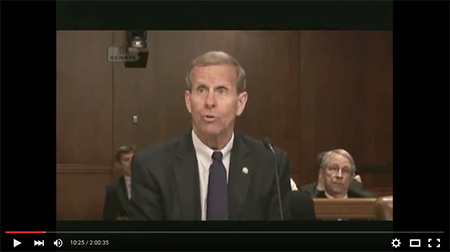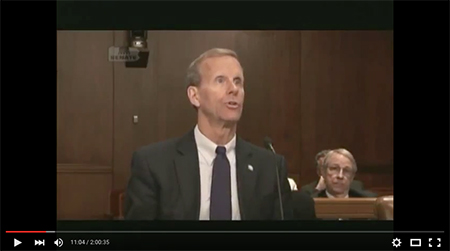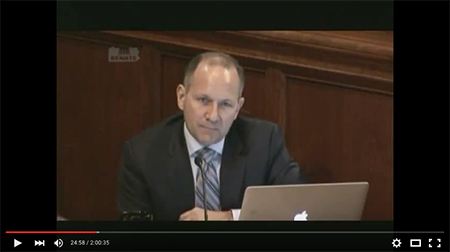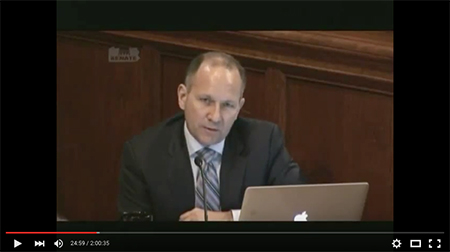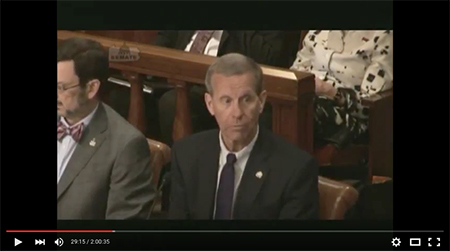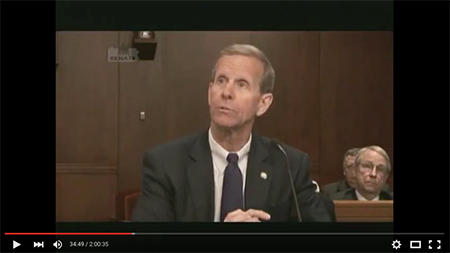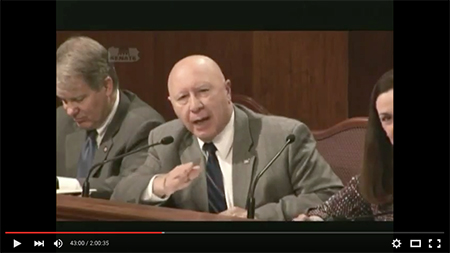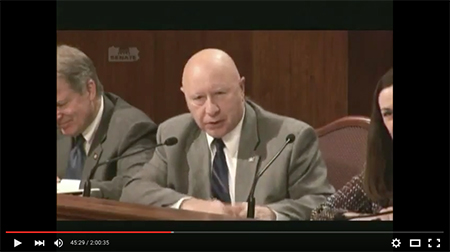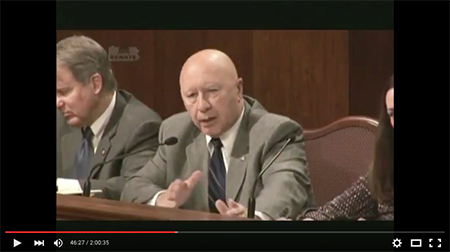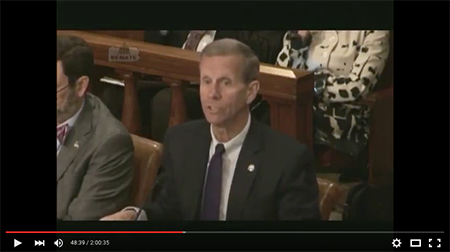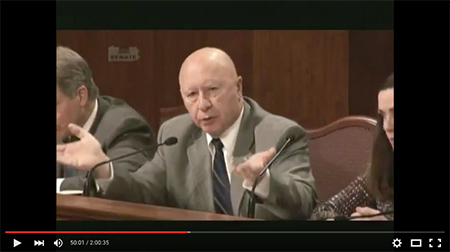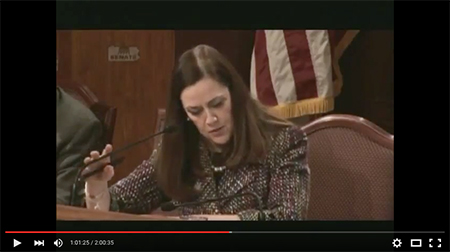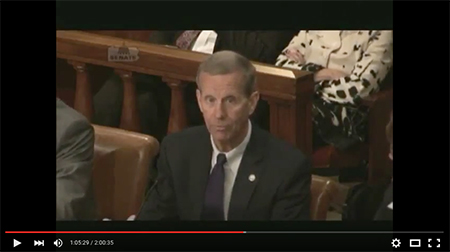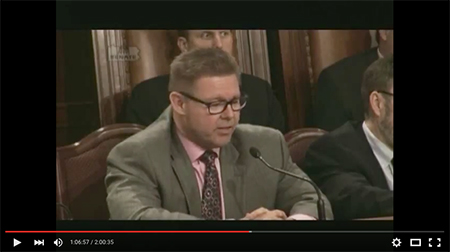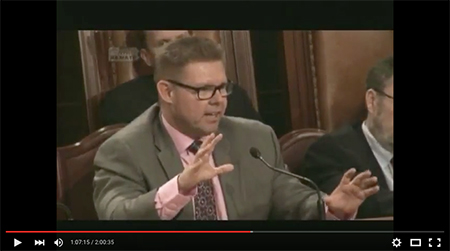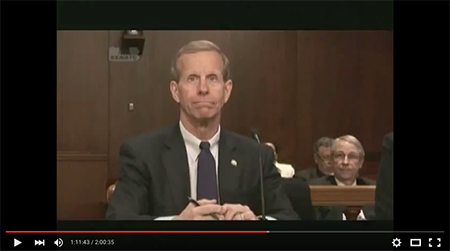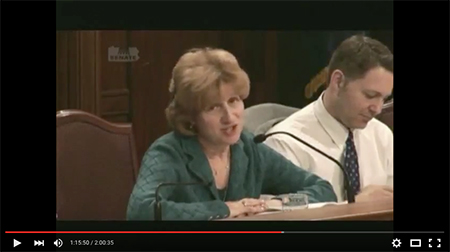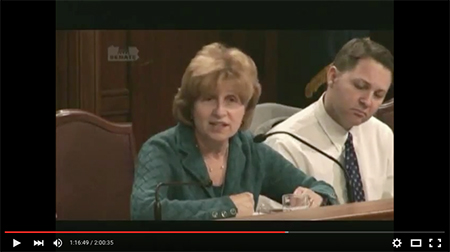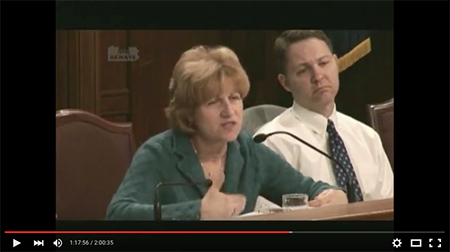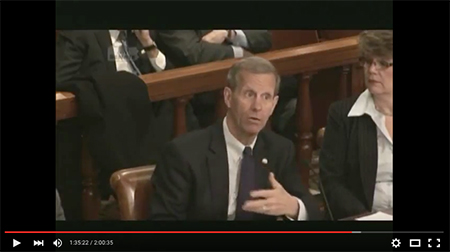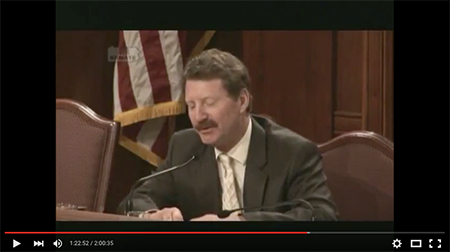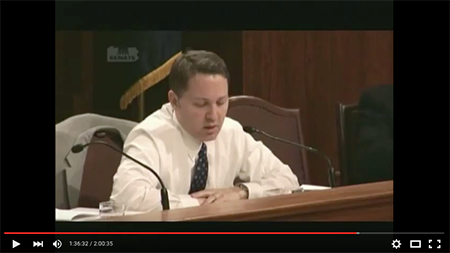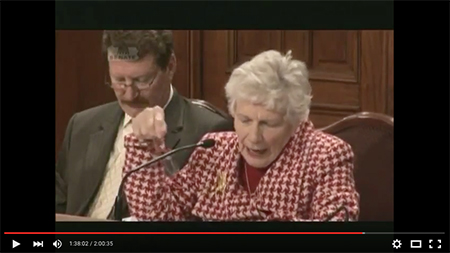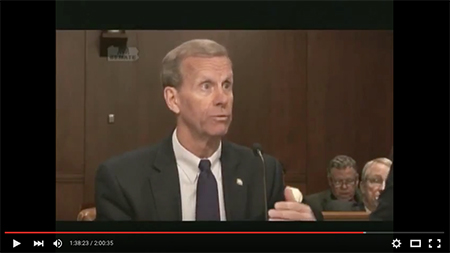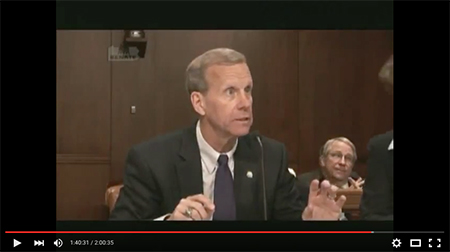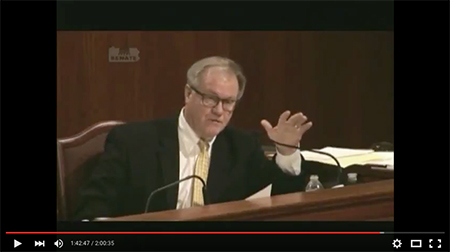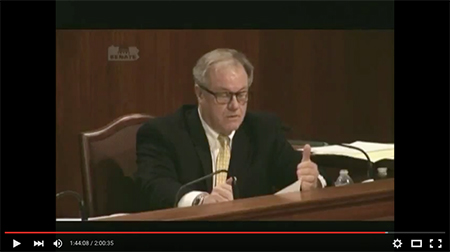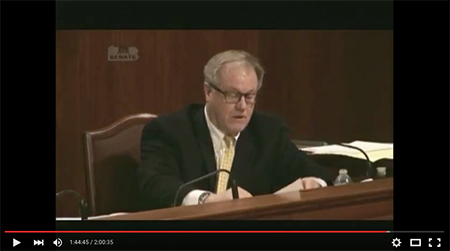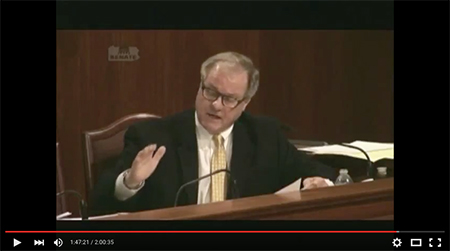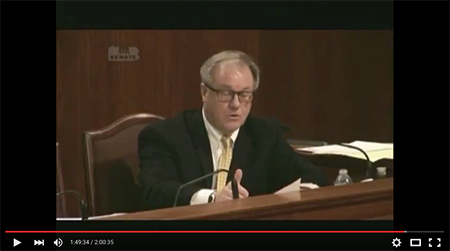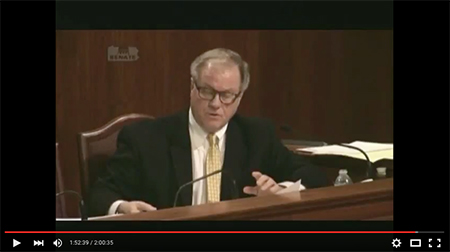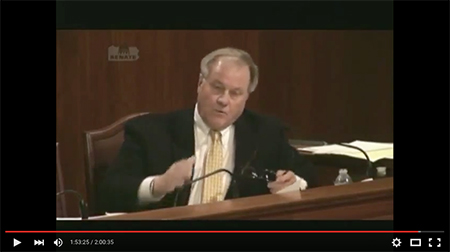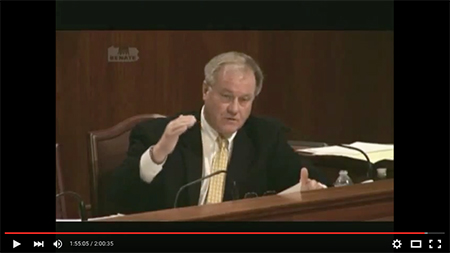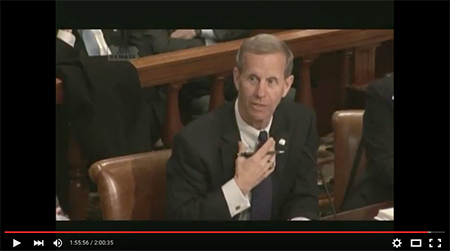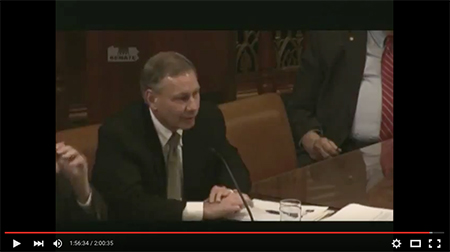Putting it all on the table: Communism, socialism, old dinosaurs, your 17-hour workweek, struggling universities and supermarkets, APSCUF bashing, per-credit tuition, and more
APSCUF live-tweeted this month’s State System budget-appropriations hearings before the House of Representatives and Senate. Last week, we compiled a list of what caught our attention during the House hearing. The Senate session, which you can watch in its entirety here, provided even more fodder. Here’s what we thought was of most interest to APSCUF members. Click on the images to watch clips.
Chancellor Frank T. Brogan began the Senate hearing with similar remarks as in the House. He described student demographics and the Pennsylvania State System of Higher Education’s economic impact in the Commonwealth. He also outlined the System’s funding issues:
He again mentioned future changes:
“Our board has made a critical, strategic decision that we are beginning to look over the next six months or so at a reorganizational and modernization effort,” he said. He did not detail what those changes would encompass.
Sen. Lloyd Smucker asked Brogan to expand on the need for a 20 percent increase in state funding:
Brogan referred to rising cost of healthcare, pensions, and general rates of inflation.
Smucker lauded the per-credit tuition pilot at Millersville University, which he called “very innovative”:
“To date, outcomes have been outstanding, have been satisfactory, there’s been no negative impact on students,” Smucker said. “In fact, students seem to be better, more savvy consumers in the choices they’re making in terms of the courses they’re selecting.”
(We are still waiting to see these outcomes. This pricing program means most full-time students are paying 25 percent more in tuition than they did previously.)
Brogan said that program will continue in the fall.
“We found that it was having either no impact, negative, or positive impact in some of the issues that we reviewed,” he said.
Sen. Andy Dinniman, who attended the Underfunded We Fail rally in February, asked about the System’s reserves, and Brogan explained (video) how universities use reserve funds to counterbalance the risk of unfunded liability.
They also can be used for deferred maintenance, Brogan said (video).
The discussion about reserves continued, and Brogan again mentioned the upcoming changes in the System:
“Markets change. Needs change. Higher education changes, and that might mean necessary change in our system,” Brogan said. “What that will look like by way of recommendations, it’s too early to tell, but I do know this. We cannot continue to function the way we are functioning as a 14 state university system with all of the issues that we are dealing with, and that includes the very dramatically changing face of higher education in the country.”
Sen. Mario Scavello asked Drew Johnson, East Stroudsburg University senior and Student Senate president who attended the hearings, what besides money he would like the committee to look at that it hasn’t:
Johnson said the loss of professional tutors has been difficult. More people need to take a bigger stake in retention of students, he said.
Scavello mentioned his background in supermarkets, saying that if a supermarket is doing poorly, he must raise prices at others to offset the loss, resulting in lost sales for the well-performing markets. He drew a parallel to the State System:
He specifically focused on Cheyney University:
“Are you looking at some of these schools, like I saw one here, 700 students?” Scavello asked. “The graduating class of my daughter’s high school was 700. I just can’t for the life of me figure out how in the world that that school is going to be able to survive. … If that school was in my area, I’d probably be saying the same thing.”
Brogan’s response:
“For the first time in the history of our system, it is one university, and we are headed toward more. We have right now universities that are eating through their operational reserves and are going to run out of operational money within the next year to two years … “
The Chancellor focused on enrollment issues, but he did not mention funding issues or the years of mismanagement that was allowed to continue by the System.
Scavello revisited his grocery-store example:
“To go back to that supermarket scenario, how it turned out was they ended up closing that store and two others because they lost a tremendous amount of volume because of the increase in retails,” he said. “And you’re pretty much describing that at the State System. I think that it’s something that you need to look at. Because personally I think that we probably could reduce tuitions in the other schools if possible because those extra dollars would be going there.”
Scavello went on to suggest other staffing cuts. Brogan explained the State System employs 900 fewer people than it did eight years ago.
Sen. Lisa Baker asked about pension and healthcare costs and the System’s pension obligations:
Brogan answered that half of employees participate in a defined-contribution plan, such as TIAA.
The discussion turned to distance education.
“This system desperately needs to look at our online education, not the individual offerings as much as how we offer online education in what I believe needs to be a much more organized and efficient manner than we do,” Brogan said, “while still maintaining the integrity of the faculty, the curriculum, the assessments, and the quality of work that comes out of the pipe.”
Sen. Richard Alloway II, a Shippensburg University graduate, said, “We need to have a serious conversation”:
Alloway’s monologue touched on communism, socialism, professors, distance learning, and the APSCUF contract:
“This system is a communist-style system, and, Frank, stop me when I’m wrong,” Alloway said. “You interject here. I want to have a dialogue with you. OK. This system is designed to be one unit. Right? One unit. And the motto is, ‘From each according … to each according … ’ That’s the motto, right? That’s how it is. So what I found a little shocking through many of these dialogues with some of my colleagues is when they become indignant about the fact that money is taken by the central office from a ‘have,’ a school that has and given to a school that doesn’t have. It blows my mind because I think, ‘What do you think a socialist-style philosophy is?’ That’s what it is. Look, we can agree or disagree whether it’s good or bad, but that’s what it is. We take from one. We give another.
“A couple, maybe about two years ago, I was called, summoned, to a meeting with the APSCUF professors at Shippensburg University. And they sat there, and they were just indignant that how dare the central office take money from them to prop up other universities. And I looked them dead in the face, and I said, ‘But isn’t that what your philosophy calls for?’ Boy, you should have seen them. They got real huffy with me after that. But this is the truth, OK?”
(Shippensburg faculty members say that four years ago, the senator was invited to a lunch. They do not recall the senator making these statements.)
“So let’s not kid ourselves,” Alloway continued. “We’re not gonna shut down universities, right? We’re not gonna shut down Mansfield. We’re not gonna shut down Clarion, these struggling universities. OK? We’re not gonna do that. So, what are we gonna do? We need to get serious about what we’re gonna do, and I know that’s what you’ve been saying this whole meeting. We have to talk about what we’re gonna do, and I don’t know what the answer is, but the market calls for a shift, just as Sen. Scavello very aptly put, when one of the markets is going down, and here’s the other thing, too: Resentment grows between the universities from the haves and the have-nots. That’s just the reality of it, OK? So we have to have a serious conversation about what we’re going to do. This system is awesome. I’m a product of this system. I love the State System. I think they put out incredible value at education. I really believe that. I look around and I see the cost of other universities, and you guys do a fabulous job, but it cannot continue, and we can’t sit here as senators and pretend that this system is gonna work. Because we can’t continue taking from West Chester and Ship and Millersville to prop up these other programs, OK? That’s the one thing.
“The second thing is, and you talked about it again: Doing what the market demands, changing these programs, shelving some of them, starting new programs. That all sounds great, but we know on the board the fight we’re gonna have ahead of us. With who? With the union, of course. Because every time you try and change the System, the union steps in and says, ‘Aw, no, you can’t do that. You can’t shelve that program because that’s a professor’s job.’ OK, well then we need to move the program from this university to here, where it can be viable. ‘Aw, we can’t do that!’ OK, then what are we gonna do? I mean, these are the realities that the members of this committee need to understand, that this is what we’re facing, OK?
“So also in that meeting at Shippensburg University, I had this one old dinosaur of a professor just sit there and rail on online learning, how awful it was and you didn’t get the college experience, and I’m sittin’ there going, I looked at him, and I said, ‘Sir, you’re gonna be run over and left in the past.’ Of course, he didn’t like that, either. But that’s the reality. But that’s the reality.
“The world has changed, and we have to change with it, and we need to untie your hands and the hands of these presidents to be able to change with the market with what the consumers want. I mean, the union fought us on this per-credit thing. Why? We’re trying to make the System strong, so it can serve everybody, and yet we get pushback and fought at every turn, every turn. ‘Well, that’s someone’s job. We can’t end that program.’ Well, tough crap.
“So, I want to have a serious dialogue. I care about this system. That’s why I asked to be on this system’s board: because I want to see the System be strong, and I want to see it serve people. It provides a great value, and I want to see it continue well into the future. Thank you for what all of you guys have done to continue to push this ball forward. I’ll be a voice for you. Thank you.”
Brogan, after seconds of silence, responded:
“As we take this new look at the System, everything has to be on the table,” he said. “If we start this process by first determining what are the sacred cows, what are the traditions that cannot be changed, what are the rules and regulations that keep us from making changes that have to be preserved moving forward, you still won’t be able to change a damn light bulb in this system without asking somebody’s special permission to do so.
“I am convinced we’ve got to unshackle these people, we’ve got to let them organize their universities in a way to serve their student population and free them up of many of the obligations that they have been bound to for 40 years that are not only not taking us forward any more, they are holding us back and, in some cases, driving us down. Everything has got to be on the table, or this will be an exercise in complete futility.
“What would we want from you all? We need you to be partners. We’re going to be going through a very emotional set of conversations. We’re going to be going through a very political set of conversations, unintentionally, but it’s unavoidable. We’re gonna need advocates who are willing to stand up and say, ‘If it is (in) the best interest of the System and ultimately the students who will be served by this system, then we’ve got to put that emotionalism and that politic aside and do what’s right. We’ve all got to be singing off of that page. …
“I was in a meeting with some council of trustee members, and when we presented their budget, they said, ‘Gee, to we really need 14 universities in this system?” Now, I know over their head was a little white bubble that said, ‘Well, I know we need ours, but do we need those 13 as members of our system?’ And that would be replayed 13 other times. Everything has to be on the table, and people need to be ready to have adult conversation about where this system goes, or we will all be wasting our time. And we’ll be having those conversations. We will involve people in those conversations. We’ll be looking at best practice around the country.
“As I mentioned, Georgia right now … they have 34 state universities in Georgia, Mr. Chairman. They are merging two of them every 18 months. They have a process and a practice they’ve put in place, and they are merging two campuses, two universities, into one every 18 months, and they’ll do another two coming up very soon. I’m not suggesting that’s the way. That’s the way they’re doing it, and that, can you imagine, the guts. Two sets of school colors become one set of school colors. Two mascots become one mascot. Unless it’s a puppy monkey baby, you’re gonna have to find a creative way to get people to satisfy the emotionalism of moving from a badger to a wolverine. I’m being silly to make a point: These are emotional and political issues. … Not just for the survival but for the flourishing of our universities, we’ve got to engage in those sorts of conversations, and everything has to be on the table to do that.”
Sen. Judy Schwank, who also spoke at the Underfunded We Fail rally, reminded the entire group that the discussion must be inclusive:
“I will remind all of us, not just you (the chancellor), that everybody has to be part of the conversation,“ she said. “And we can rail against certain entities or groups, but they’ve got to be part of this because they are a key factor in making sure that our students get the education that they need. … But you look at a Cheyney or you look at a Millersville or you look at, for example, Kutztown. They are vital parts of our community. They are great economic contributors, but they’re also a part of the institution, too. So those entities also have to be involved in this conversation as well.”
She continued.
“And I will remind you, too, that you know we had the opportunity not too long ago, for example, to appoint a retired professor to the board of governors, and that didn’t happen for whatever reason, and I was disappointed in that because I think there’s some expertise there that we are perhaps not bringing. We don’t always want to hear everything that people bring to us, but that’s got to be part of this process, too. So I do want to remind everybody that that’s the case as well.”
(Thank you, Sen. Schwank.)
Schwank later asked Johnson how tuition increases are affecting students:
“From my perspective, the conversations don’t lead down the path of how expensive tuition is,” he said, “but more so, ‘I qualify support, and the support that I am told that I’m entitled to isn’t coming to me,” referring to grants stalled by the budget impasse.
“We are juggling — whether or not we want to buy this book during syllabus week, when I have two chapters due next week, or do I want to pay my rent for this month?” he said. “ … It fosters a lot of frustration and a lot of concern for students,” he said. “It keeps many from coming back.”
On campus crime:
State System campus crime statistics generally are lower than the surrounding municipalities, Brogan said.
More than one senator asked how many State System students stay in Pennsylvania after graduation. The answer 90 percent are from Pennsylvania, and more than 80 percent stay in Pennsylvania:
Sen. Pat Vance asked how how much employees pay for their healthcare:
Brogan referred to the “modifications to contribution rates”:
Vance went on to ask how many hours faculty members teach in a week:
Brogan’s answer: 17 hours, including office time. He mentioned release time for APSCUF chapter presidents and curriculum-committee chairpeople.
Sen. Scott Wagner began his time by warning Johnson: “Drew, you’re gonna get a little bit different education today.”
“I have a different spin,” Wagner said. “I appreciate your comments, but you made one comment, and it was very interesting, and I’m glad you told us that young people feel their pockets are being picked. And you are exactly right, and you are in the building that is doing it, and we’re doing it good.”
“We have no more runway here,” he continued. “I will tell you that where I’m coming from I will not vote for any tax increases. I will lobby my colleagues.”
Wagner was blunt about what he called underperforming or unprofitable schools:
“If you have schools that are technically, in my world, underperforming or unprofitable, they should be closed, and they should be closed quickly, and we don’t need a task force, and we don’t need to micromanage or analyze and become caught up in analysis paralysis. So what I’m doing is I’m taking a 40,000-foot view. So I’m going to start running through your financial statement.”
Wagner went on to ask questions about the System’s reserves and interest.
Wagner asked about the System’s changes to healthcare costs. The System’s average employee contribution is 15 percent, Wagner said, citing a State System-provided chart. He said the U.S. average was 28.2 percent.
“If you were to use 28.2, the national average, against your healthcare contributions on the part of the people in your system, it’s $42 million,” Wagner said.
On unions representing State System employees, specifically, he said (video), “You’re also challenged because you have roughly 10,000, 11,000, unionized employees.”
“Your compensation costs are going up at least 10 percent a year. This is a trend that cannot continue,” he said, referencing 2015 wage increases for represented employees.
Wagner went on to comment on salaries, bringing Johnson in to the fray:
“You gave us a list of all new hires since July 1 of 2015, and compensation,” Wagner said. “Is it possible to get a list of all people in the System? Because I was looking through here … and Drew, I didn’t know if you knew that the swim coach at West Chester made $420,000 last year. I didn’t know if you knew, so you might want to consider swim coaching as your new career.”
(The compensation to the West Chester swimming coach was a one-time payment to make up for years of contract violations by the System.)
Wagner asked what the average college professor earns, so he could calculate what amount a professor would take home in retirement. Again, he addressed Johnson in his remarks:
“So, Drew, for your education, the professor that’s in your classroom that’s getting ready to retire after 25 years that maybe is making $125 a year, he’s gonna retire with $100,000 a year for the rest of his life. That’s where your pockets are being picked. … I would start wearing pants with zippers on because your wallet’s about ready to be taken away from you.”
Brogan replied, “That’s one of the reasons that we say when we talk about a reorganization and modernization, that’s why I use the phrase, ‘Everything has got to be on the table, not just some things, or it won’t work.’”
With no preamble, Sen. John Eichelberger jumped into commentary on professor salaries:
“At 97 grand, these are the people that are working 17 hours a week. Wow,” Eichelberger said, “Can I get a signup list here, going in the senate?”
Have an urge to contact some legislators after reading this? Find their contact information here.

